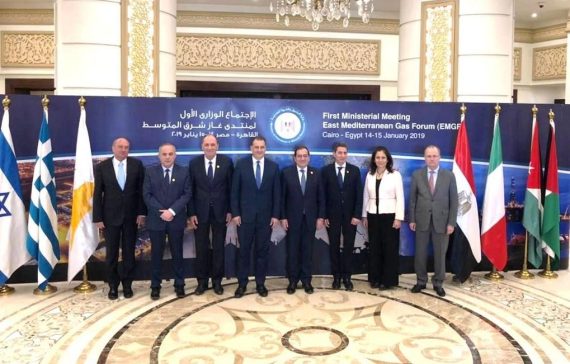The status quo in Cyprus may be unlikely to change any time soon, but an international gas bonanza in the Eastern Mediterranean is certainly causing enough geopolitical shockwaves to rock the boat. Hydrocarbon exploration in the Levant Basin has been underway for a decade, but it is only recently that regional countries have made real strides toward forming a joint energy hub. In mid-January, Egypt, Greece, Israel, Italy, Jordan, Palestine and the Greek Cypriot-controlled “Republic of Cyprus” agreed to establish the East Med Gas Forum (EMGF), which not only seeks to boost domestic consumption of shared resources, but also aims to deliver gas to Europe via a 2,000-kilometer undersea pipeline. The feasibility of that pipeline aside, the EMGF was the first successful attempt to forge some kind of hegemony in the Eastern Mediterranean since natural gas became a mutual incentive for regional cooperation.
However, the EMGF failed to achieve complete hegemony in the region. By overlooking unresolved overlapping claims to Exclusive Economic Zones (EEZ), the bloc in effect split the sea in half. It pitted those who were “in” against those who were “out,” the latter comprising of Turkey, Syria, Lebanon and the Turkish Republic of Northern Cyprus (TRNC). In the absence of an EEZ demarcation deal with Athens, Ankara has accused Greece of using its sovereignty over the island of Kastellorizo, located two kilometers south of the Turkish coastal province of Antalya, to usurp a huge chunk of the Eastern Mediterranean and confine Turkey to the Bay of Iskenderun. Likewise, the island of Cyprus finds itself caught between two clashing EEZ claims, one issued by the Greek Cypriot administration in the south, and one issued by the Turkish Cypriot government in the north.
In mid-January, Egypt, Greece, Israel, Italy, Jordan, Palestine and the Greek Cypriot-controlled “Republic of Cyprus” agreed to establish the East Med Gas Forum (EMGF), which not only seeks to boost domestic consumption of shared resources, but also aims to deliver gas to Europe via a 2,000-kilometer undersea pipeline.
While the Greek Cypriot claim has international backing, it lacks recognition from Turkey, which instead endorses the Turkish Cypriot claim. Turkey, however, has repeatedly urged countries to delay exploration off Cyprus until the island’s divided Turkish and Greek Cypriot communities decide how to share resources fairly. These calls have been ignored, as French, Italian, American, Israeli, South Korean and Qatari energy giants have mobilized to exploit the reserves on invitation of the Greek Cypriot administration. In protest, Turkey and the TRNC have also announced plans to begin their own drilling operations in the same areas. It is within this climate of uncertainty that the Med 7, a grouping of seven southern European Union member states – France, Greece, Italy, Malta, Portugal, Spain and the “Republic of Cyprus” – has rushed to pick sides.
Naturally, at the Fifth Med 7 Summit in southern Nicosia on January 29, Greek Cypriot leader Nicos Anastasiades used the platform to promote the proposed Eastern Mediterranean pipeline to an audience which included the leaders of fellow EMGF member states Greece and Italy. In a joint declaration, the group reiterated their support for the Greek Cypriot administration, adding that the Mediterranean was a “strategic corridor” for bringing gas to Europe. Perhaps the strongest words at the summit came from France’s President Emmanuel Macron, who offered his full backing to the Greek Cypriots and said he was “very concerned” by developments off Cyprus, apparently referring to the arrival of a Turkish seismic vessel south of Limassol. In a statement released two days later, the Turkish Foreign Ministry called the declaration “unfair and unconstructive,” and said it was a clear display of the Greek Cypriot administration’s “abuse” of its EU membership.
EMGF failed to achieve complete hegemony in the region. By overlooking unresolved overlapping claims to Exclusive Economic Zones (EEZ), the bloc in effect split the sea in half. It pitted those who were “in” against those who were “out,” the latter comprising of Turkey, Syria, Lebanon and the Turkish Republic of Northern Cyprus (TRNC)
Such rhetoric over Cyprus between Turkey and EU members is typical at a time of stagnation in Turkey’s EU accession process. As the EU recognizes the Greek Cypriot administration as the sole legitimate authority on the island, Brussels considers the Turkish Cypriot north to be an illegal occupation of EU territory. Turkey, on the other hand, sees its presence in northern Cyprus as necessary to maintaining peace on the island until a deal is struck to ensure the safety and equality of Turkish Cypriots under a UN-backed bi-zonal federation. Ankara also argues it is acting in line with a 1960 treaty, granting it the right to intervene in Cyprus to restore the state of affairs, which was disrupted in a Greek-inspired coup in 1974.
But this time there is more at stake than the Cyprus dispute, or even Turkey-EU relations. The matter is also a lot bigger than the Eastern Mediterranean pipeline, which many experts have already dismissed as a commercially and technically non-viable pipe dream. Even if governments disagree with this outlook, pumping hundreds of millions of taxpayer money into studies to convince energy firms that the $7 billion project is a lucrative venture, it will ultimately be private companies who will have the final say. In the past, less ambitious projects, such as the $5.7 billion Nabucco pipeline, have failed despite receiving wide political approval. So far in the Eastern Mediterranean, energy firms have only voiced support for domestic potential.
Recommended
There is also no commitment from European countries to import Eastern Mediterranean gas. Following Russia’s annexation of Crimea from Ukraine in 2014, Europe became desperate to diversify its gas supply away from Russia, which owns around a third of the European gas market. Yet Germany, Europe’s biggest gas importer, continues to proceed with the Nord Stream II pipeline project, doubling its reliance on Russian gas. There is also a growing interest in Liquefied Natural Gas (LNG) in Europe, a market dominated by exports from Qatar, Algeria, Nigeria, and increasingly, the US. The Eastern Mediterranean pipeline additionally faces competition from Norwegian gas, which in 2017 saw its exports to Europe hit a record high.
Therefore, one could say the Eastern Mediterranean pipeline is nothing more than a carrot on a stick. But why? I argue that this latest episode of drama in the region is actually born out of a leadership crisis in the EU. With what looks to be a significantly weakened and politically polarized Britain pulling out of the bloc, and disunity within the fragile German coalition government, an evermore dynamic and energized France under the leadership of its charismatic young president is increasingly asserting itself as a main player in the continent, and beyond.
One could say the Eastern Mediterranean pipeline is nothing more than a carrot on a stick. But why?
Just as he has spearheaded calls for an EU army as opposed to greater participation in NATO, President Macron has also made no secret of his ambition to once again spread French influence across the Middle East and North Africa, particularly in Syria, Lebanon and Libya. Likewise, it is no coincidence that France is currently in talks with the Greek Cypriot administration to gain access to the Evangelos Florakis naval base in Mari and the Andreas Papandreou air base in Paphos. While this request can be linked to the regional offshore activities of French energy giant Total, it is also a message of mistrust to France’s allies in the West. Through this move, France will no longer depend on permission to use the British bases in Dhekelia and Akrotiri to conduct military maneuvers in the region, and will be freer to act unilaterally in accordance with its own national interests, which could in fact challenge those of its Western allies.
If France wishes to expand its reach, it would need to keep rival forces out of the territories where it seeks to plant its seeds of control. In the case of the region at hand, that would mean keeping Turkey boxed in to prevent it from filling numerous power vacuums that have arisen after years of conflict. To achieve this, France would need to stir tensions in the Eastern Mediterranean to create an anti-Turkish bloc. Will this stop Turkey from asserting its rights in the Eastern Mediterranean? Probably not, but it will certainly provide the boogeyman narrative France needs in order to gain a strategic foothold.
Yet French military bases in Cyprus may be viewed by Britain as an intrusion on its turf. Britain has maintained a 140-year presence in the former colony, and to this day uses its bases carry out operations in the Middle East and secure access to the Suez Canal. With a no-deal Brexit looming, Britain cannot afford to have its position in the Mediterranean threatened, especially as the EU utters support for Spain’s claims to Gibraltar. It is likely, therefore, that Britain and Turkey will step up bilateral cooperation to counter French-led efforts in the region.
One way to do this would be to lobby for a more realistic pipeline project through Turkey. Even if this route fails to attract European buyers, the growing Turkish gas demand may lead Israel and Egypt to defect from the EMGF and instead target Turkey as their primary destination market. Consequently, this would also encourage a settlement of the Cyprus problem. Furthermore, if the British can successfully convince their friends across the Atlantic that keeping the French out of the Eastern Mediterranean is in the best interest of the Anglo-American alliance, it may open a new chapter in Turkey-U.S. relations, which could pave the way for an alternative hegemony that strengthens the bond between all U.S. allies in the region.





